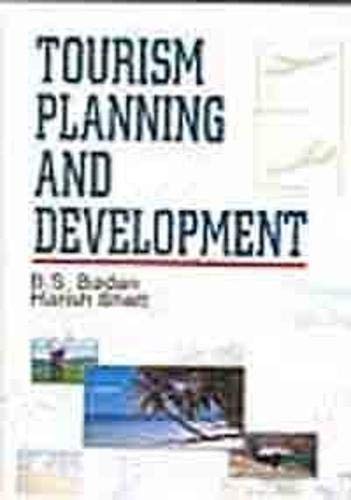
Original Title
Tourism Planning and Development
Subject & College
Series
Publisher, Place
ISBN 13
978-8131100653
Format
Paperback
Language
English
Average Ratings
Readers Feedback
Tourism can be defined as the act of travel for recreation, and the provision of services for this act
"Tourism can be defined as the act of travel for recreation, and the provision of services for this act. It is a service industry, comprising...Read More
Golait Kalyani Rajendra
Tourism can be defined as the act of travel for recreation, and the provision of services for this act
“Tourism can be defined as the act of travel for recreation, and the provision of services for this act. It is a service industry, comprising several tangible and intangible components. The tangible elements include transportation systems-air, rail, road, water and now, space; hospitality services, accommodation, foods and beverages, tours, souvenirs; and related services such as banking, insurance and safety and security. The intangible elements include: rest and relaxation, culture, escape, adventure, new and different experiences.
Travel and tourism is a major industry in the world and is at the top of the league of invisible earners of foreign currency. Many sovereignties, along with their respective countries and states, depend heavily upon travel expenditures by foreigners as a source of taxation and income for the enterprises that sell services to these travellers. Consequently the development of tourism is often a strategy employed either by a non-governmental organization or a governmental agency to promote a particular region for the purpose of increasing commerce through exporting goods and services to non-locals.
During recent years the tourism industry has witnessed unprecedented growth. Increasing consumer demand for educational and participatory travel experiences has resulted in a variety of specialty niche markets such as ecotourism, cultural-heritage tourism, and agritourism. New paradigms link strategic tourism planning with sustainable development.
The leisure and tourism industry is one of the leading global economic activities, a multi-billion-dollar industry with 700 million international travellers per year around the world. Tourism is a motor for employment and income creation and, especially in poor countries, a vehicle for development. But today it i is not sufficient to simply create employment without regard for the quality of jobs and the social and environmental effects of tourism in vulnerable areas. A growing number of organizations, including the tourism industry leadership, are increasingly conscious of the risks and are adopting a more responsible attitude.
The present publication provides an authoritative look at how to manage travel and tourism industry in a better way. It introduces the complexities of the tourism system so that they will be better positioned to eventually assume the managerial challenges and responsibilities in a diverse and challenging industry. The latest advancements in tourism theory and thinking, retaining the thoroughness of content, diversity of applications, regional and international issues, economic significance, tourism operators and the role of technology in the tourism industry etc. are also described elaborately. Numerous regional and global case studies and examples are included to provide an appropriately broad geographic context. This work will be highly informative and useful to students, researchers, policy makers, managers and working groups of travel and tourism industry.
B.S. Badan
Harish Bhatt”
